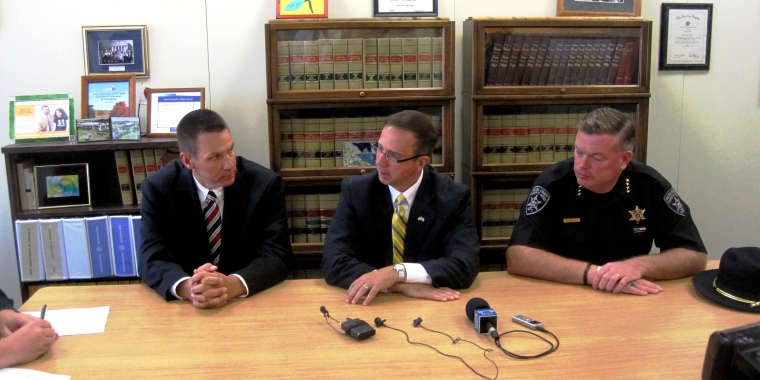
Griffo Wants Mandatory Video Arraignments
Joseph A. Griffo
September 19, 2011
-
ISSUE:
- Judiciary
- Correctional

Griffo Bill Removes Roadblock to Video Arraignments
(Utica) - As part of his commitment to support the justice system and increase governmental efficiency, Senator Joseph A. Griffo (R-IP-C, Rome) has introduced a landmark bill (Senate # 5686) that would authorize the electronic appearance of a defendant in arraignments, without the consent of such defendant.
Senator Griffo was joined by Oneida County District Attorney Scott D. McNamara and the County Sheriff Robert M. Maciol, who both spoke of the potential benefits that changing the law could create.
“The idea of video arraignments is to streamline the process and reduce costs that are required to transfer a prisoner to and from a county jail,” Griffo said. “Currently law requires that a prisoner consent to a video arraignment, which means that all the power to decide this is effectively in the hands of someone who is suspected of breaking the law and who has been arrested. Not surprisingly, few criminals want to make life easy, and so very few allow counties to use the time-saving and cost-saving process of video arraignments.”
“I support any positive use of technology which reduces the time and costs to transport offenders,” said Sheriff Maciol, “I’m satisfied that if all arraignments could be done in this way, it would ease the public safety demands for court personnel, the general public and the offender population.”
Griffo said his bill would restore the proper balance. “There may be cases where prosecutors, county sheriffs and defense attorneys agree that a video arraignment would not be in the best interests of justice. However, no longer would the justice system be held hostage by the whims of the defendant.”
“The interactive video and audio arraignment process is already used in the majority of states nationally,” McNamara noted. “In New York, it’s watered down because it’s elective. By making it compulsory, the due process of the accused moves forward without delay and without jeopardizing any of their rights.
“The cost of transporting incarcerated defendants back and forth from court for arraignment is very expensive. The availability of electronic equipment to enable video arraignments would over the long term save counties a great deal of money in transportation costs including those costs of officers in supervision of the defendant while traveling and in court. This saved money would then be one less burden on law-abiding taxpayers,” Griffo noted, adding that video arraignments have been in use elsewhere in the country and are not an experimental technology, but a proven part of the justice system.
Griffo noted that this legislation only applies to arraignments and not to hearings or trials.
-30-
